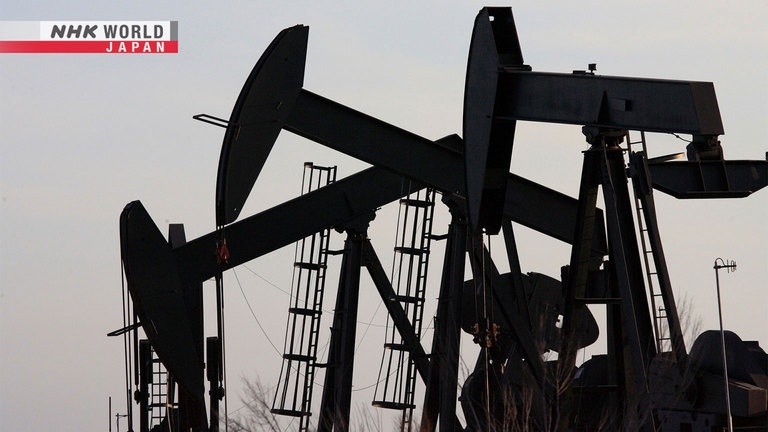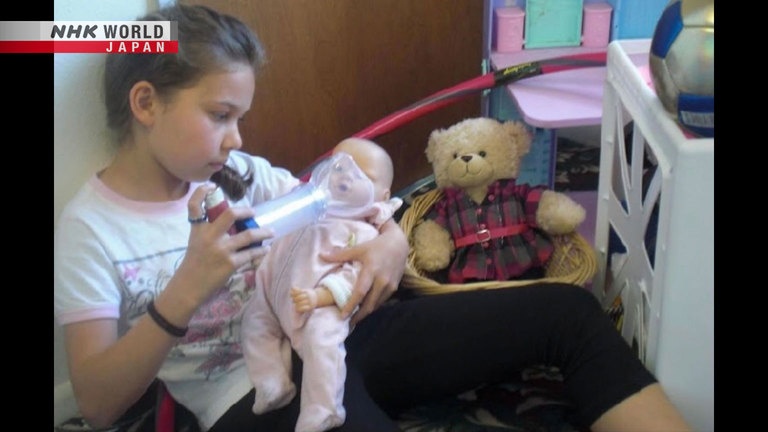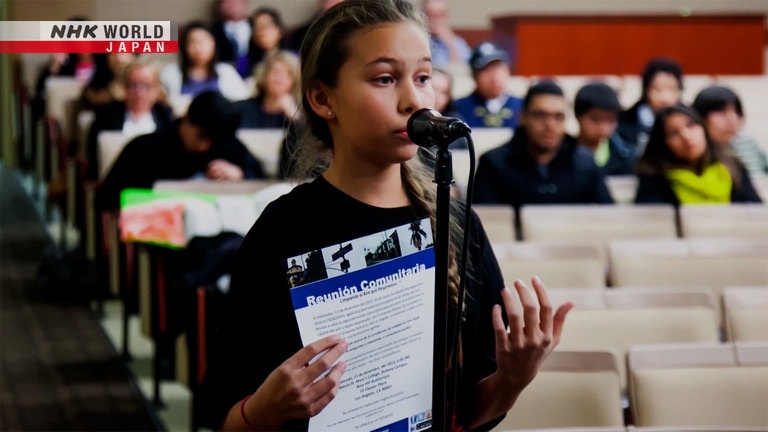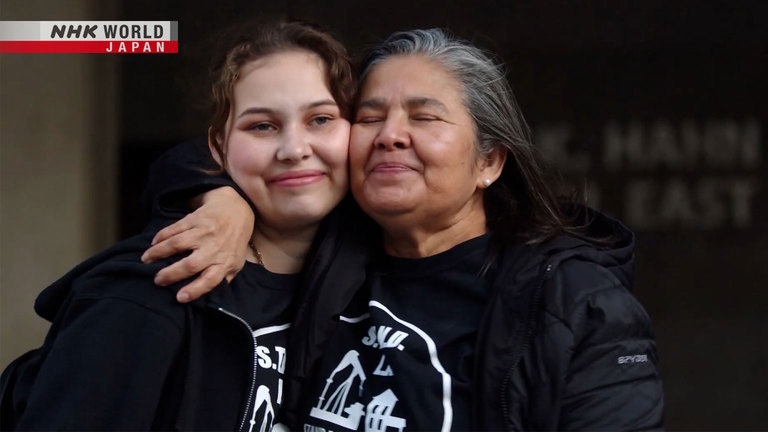Clean Air for Everyone: Nalleli Cobo / Environmental Activist
At 9, Nalleli Cobo, her mom, and their community began battling toxic oil drilling. In 2020, LA Council passed the "Phase-Out" resolution. We talked to Cobo about her unwavering passion for the cause.




Transcript
Direct Talk
Today's guest is
environmental activist Nalleli Cobo.
Cobo's community during her childhood
had an oil drilling site
that posed a serious health hazard.
When she was nine, she founded
an organization with her mother
that called for the shutdown
of oil well operations in the area.
When she was 13,
she founded an organization
that sought to end the health hazards of
oil wells throughout the city of Los Angeles.
It was a battle she fought while she was ill.
Cobo's work paid off, and in 2020,
the Los Angeles City Council
passed a resolution
to shut down oil well operations in the city.
In 2022, Cobo was awarded
the Goldman Environmental Prize,
which equates to a Nobel Prize
for environmental movements.
We ask Cobo about her progress so far
and her vision for the future.
Los Angeles is known for its
beautiful beaches, sunshine, and Hollywood.
But in this city,
oil drilling is taking place
right across the street
from a residential neighborhood.
When we think of Los Angeles,
we think of
the beaches or palm trees,
Disneyland, influencers.
We think of the glitz and glamor
that is Hollywood.
And we don't think about the reality.
And the reality is that we're drilling
toxic oil wells next to people's homes.
Drilling in Los Angeles has started
since the discovery of oil fields in the 1890s.
The United States is the
world's largest producer of crude oil.
How come it's the reality
for more than 18 million Americans
living one mile or less
to an active oil and gas well.
In the city of Los Angeles, this is the
largest urban oilfields in the nation
with over 580 Angelinos live in
a quarter of a mile or less
to an active oil and gas well.
Nalleli was born in Los Angeles in 2002.
Her mother, Monic,
is an immigrant from Mexico.
Monic raised Nalleli as a single mother
while working for a non-profit organization
that seeks to improve
the living conditions in the community.
The family lived in "University Park."
It's a neighborhood
with a large Hispanic population.
The community of University Park
is where I grew up
and it is such a vibrant community
that I can't help but smile
when I talk about it because it was family.
It was a type of community that
if my mom was making breakfast
and she realized she didn't have the cheese
for our omelets, we could ask our neighbor
and they would give us cheese
and tomatoes and spinach to jazz it up.
And it was...
If we saw the ice cream man walking home
from school and we didn't have cash,
he would say, "Just pay me next time,"
and I could get my popsicle.
And that was the unity and the sense
of family that we had within our community.
That is truly something you treasure
throughout your entire life.
There was an oil drilling site
10 meters next to Cobo's house,
and one day she said she smelled
a strange odor coming from the area.
When drilling for oil,
it often smells like rotten eggs,
but something this oil well
would do in my community
is add more chemicals to mask the smell.
So then my community would smell
of cherries, guava, chocolate, citrus,
and that shows how far
they're willing to go to cover their tracks.
Then, something strange happened
to nine-year-old Cobo's body.
I started getting headaches, stomach pains.
I got body spasms
that were so severe I couldn't walk.
My mom would have to carry me
from place to place.
My nosebleeds got so intense.
I could no longer sleep in my own bed.
I would have to sleep in a chair
to prevent choking on my own blood at night.
I developed asthma. That's something
I'm always going to have to live with now.
I had heart palpitations and
used heart monitor for several weeks.
It was
so much unknown
and so much fear that was going through
my little nine-year-old body.
Similar conditions also
started to appear in her family.
My brother has asthma,
my sister has thyroid issues.
My other sister had extreme
stomach pains, headaches.
My mom developed asthma at the age of 40,
which is really unheard of.
My grandma developed it at the age of 70,
which is even more unheard of
because asthma is typically
developed within adolescents age.
The health conditions were
quickly pointed to the oil well.
Her mother, Monic, took action.
Nalleli and her mother
founded a mission called
People Not Pozos,
meaning People Not Oil Wells.
They surveyed neighborhood homes,
asking people about their health.
They also took air samples
and sent them to a laboratory
to see how they were linked to the oil wells.
Cobo also gave a speech
at a public hearing in the city
to highlight the existence
of the health hazard.
She was nervous but her mother
encouraged her to keep going.
She was like, you have to remember
what you are sharing is your truths.
And that's what I've always shared
at this point is that
I don't know all of the science, I don't know
all of the legal terms, but I know my story.
I know how my body has been affected,
how my families and my community
has been impacted.
And that's what I'm always going to share
truthfully and unapologetically, because
storytelling is a compelling form of activism
that oftentimes goes unnoticed.
And I'm trying to bring it back.
However, some adults
reprimanded the still young Cobo.
I introduced myself
by saying the grade I was in
because I thought that was necessary.
I was like, I'm a fourth grader
at this school and I am 10 years old.
I am here to do this.
And I was always met with adults
and they would say,
you know, you should leave us to the grownups.
You should be in school.
My response to the grownups
because they were grownups to me, was,
you're right, I should be in school,
but you're not doing your job at protecting me
in my community so I have to be here.
Cobo was 12 when one day
she received word
that the oil field company was
voluntarily shutting down operations.
My mom got a phone call, she excused herself
for a family dinner and she started crying
and I started poking her and I was like,
"Mom, who is it? What's going on?"
And she hung up the phone
and she looked me in the eye.
She said, AllenCo is closing.
And I... Oh, my gosh I think I'll cry.
I got so excited that I didn't know
what to do with all of this energy
that I asked if I could scream in the house.
I was like, "Can I scream?"
And she was like, "Yeah."
And I was just screaming and
I ran to the window and I opened it,
which is so simple.
But that's something
that we couldn't do for years,
You're tearing, my eyes too.
It was a special day for sure.
She said the change was quickly felt
after the wells were shut down.
It was such a drastic impact
that I could sleep in my own bed again.
I didn't have my chronic nosebleeds.
I didn't have to use my inhaler
three times a day anymore.
I could go outside.
I wasn't sick anymore.
They went away. Every symptom that I had
went away except my asthma.
The different was truly night and day.
As Cobo grew up, she realized that
the problems of oil wells
were not limited to her community.
She expanded the scope of her activities.
I was fighting to shut down
the world in my community.
And when we did that, I realized that
there are so many other communities like mine.
So I moved from my community
to the city of Los Angeles.
And when I realized the state of California
is just as bad, I moved to the state,
then the nation.
And it's always been like sort of
a ripple effect within my activism.
But I never sat down
and said, I want to do this.
It was
I learned that night that I was 30 feet
from an active oil and gas well.
And from then my life changed.
And from then I took a different turn.
That's something I never thought
I would do, but it was
again, how can I let an injustice go by
because I'm just too afraid to speak out?
In 2015, Cobo co-founded the
South Central Youth Leadership Coalition.
She has expanded the scope
of her work to include all of L.A.
and has advocated for the elimination
of health hazards caused by oil wells
by creating buffer zones between
homes and schools and the wells.
She also studied hard
to become a civil rights lawyer
in order to help the vulnerable.
She also became passionate about dancing.
and just as she was enjoying
her youthful days.
A month after I turned 19,
on January 15th of 2020,
I heard the words, you have cancer.
And I was diagnosed with
stage two reproductive cancer.
And ultimately I was,
I was forced to choose between
my reproductive system and my life.
And I'm here, but I fight
so that decision ends with me.
Because no 19-year-old
should have to make that decision, and
my cancer, my cancer treatment
was really intense.
It was an entire year.
I went through three surgeries,
three rounds of chemo,
six weeks of radiation,
eight minor procedures.
And I fought off two infections
before I heard the words you are cancer free.
Cancer was
cancer forever impacted me
and it changed the quality of my life.
I am now disabled.
I am now chronically ill.
I am no longer a professional dancer.
I may have lost a lot, but I still
have my body and I still have a voice.
And that's as long as I have those things,
I'm going to continue to be a voice for change
and an unapologetic voice
for my community and those like
because no oil well should be placed
next to a community.
Despite her illness,
Cobo has continued to advocate
for the elimination of the health hazards
caused by oil wells.
In 2020, the Los Angeles City Council
passed an ordinance to phase out
all oil wells in the city.
The historic vote.
Los Angeles is the largest
urban oil fields in the nation.
Throughout these next 20 years,
I will be able to say Los Angeles
was the largest urban oil fields in the nation
because of the tireless work that we've done
as communities and
community-based organizations
and demanding clean air in our homes.
This is definitely
a David versus Goliath fight.
But I know how that story ends.
So I'm very happy to be David
in this fight with my community.
Cobo described the society she strives for.
I dream of a world where urban oil drilling
is only read about in history books.
dream of a world where
kids look outside and they see trees
and not oil rigs or refineries.
I dream of a world where
everyone is safe on this planet,
including animals and people, because
it's intersectional,
you know, we give so much to the earth
and the earth gives so much to us
both within our animals, within our ocean,
within the air and trees and the movement
that we have, everything is life.
And I have a very good friend
who has a quote that's said, that she says,
Healing the earth, heal no,
healing ourselves heals the earth
and healing the earth heals ourselves.
That's exactly what this movement
comes down to.
It's what are you going this
what we're living in is a moment in history.
This is that moment where we get to look back
in the history books and documentaries
and see which side of history we were on.
And this is the time to decide
which side of history you want to be on,
whether you're going to be advocating for
a better planet, a better, sustainable world
for animals and all breeding things,
including humans and our oceans and trees.
Where are you going to sit this one out and
wait until your life is the one on the line?
Because then it'll be too late.
Cobo left us with her favorite words.
I say "Si, se puede"
which means "Yes, we can."
It was started by Dolores Huerta which was
Cesar Chavez's main partner with
fighting for the United Farm Workers
and it's something that I've always heard
growing up said "Si, se puede," Yes, we can.
And it was
reminding ourselves that
yes, we may not have a degree.
We may not know all of the science,
all the legal terms, but
we know that no oil wells
should be placed in our communities
and it's possible to shut them down.
And whenever I would be like,
okay, this is it's been ten years,
it's been 11 years in this fight,
I would just remind myself
"Si, se puede," "Yes, we can."
And it was something that
I've always heard growing up and
coming from
Dolores Huerta and Cesar Chavez
which are huge role models for me
and the movement,
it was very special to me.